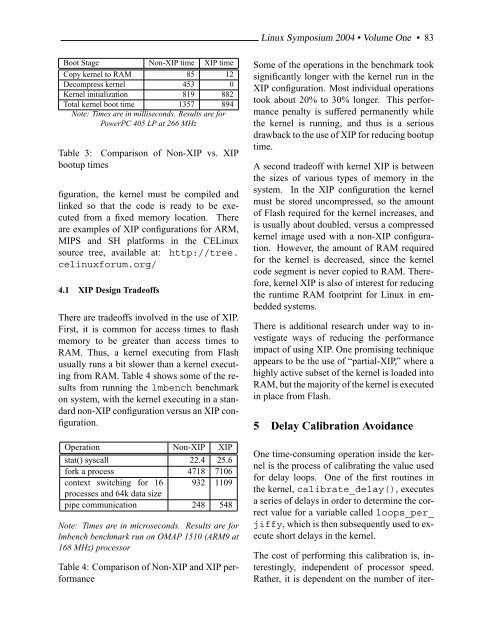Create successful ePaper yourself
Turn your PDF publications into a flip-book with our unique Google optimized e-Paper software.
<strong>Linux</strong> Symposium 2004 • Volume <strong>One</strong> • 83<br />
Boot Stage Non-XIP time XIP time<br />
Copy kernel to RAM 85 12<br />
Decompress kernel 453 0<br />
<strong>Kernel</strong> initialization 819 882<br />
Total kernel boot time 1357 894<br />
Note: Times are in milliseconds. Results are for<br />
PowerPC 405 LP at 266 MHz<br />
Table 3: Comparison of Non-XIP vs. XIP<br />
bootup times<br />
figuration, the kernel must be compiled and<br />
linked so that the code is ready to be executed<br />
from a fixed memory location. <strong>The</strong>re<br />
are examples of XIP configurations for ARM,<br />
MIPS and SH platforms in the CE<strong>Linux</strong><br />
source tree, available at: http://tree.<br />
celinuxforum.org/<br />
4.1 XIP Design Tradeoffs<br />
<strong>The</strong>re are tradeoffs involved in the use of XIP.<br />
First, it is common for access times to flash<br />
memory to be greater than access times to<br />
RAM. Thus, a kernel executing from Flash<br />
usually runs a bit slower than a kernel executing<br />
from RAM. Table 4 shows some of the results<br />
from running the lmbench benchmark<br />
on system, with the kernel executing in a standard<br />
non-XIP configuration versus an XIP configuration.<br />
Operation Non-XIP XIP<br />
stat() syscall 22.4 25.6<br />
fork a process 4718 7106<br />
context switching for 16 932 1109<br />
processes and 64k data size<br />
pipe communication 248 548<br />
Note: Times are in microseconds. Results are for<br />
lmbench benchmark run on OMAP 1510 (ARM9 at<br />
168 MHz) processor<br />
Table 4: Comparison of Non-XIP and XIP performance<br />
Some of the operations in the benchmark took<br />
significantly longer with the kernel run in the<br />
XIP configuration. Most individual operations<br />
took about 20% to 30% longer. This performance<br />
penalty is suffered permanently while<br />
the kernel is running, and thus is a serious<br />
drawback to the use of XIP for reducing bootup<br />
time.<br />
A second tradeoff with kernel XIP is between<br />
the sizes of various types of memory in the<br />
system. In the XIP configuration the kernel<br />
must be stored uncompressed, so the amount<br />
of Flash required for the kernel increases, and<br />
is usually about doubled, versus a compressed<br />
kernel image used with a non-XIP configuration.<br />
However, the amount of RAM required<br />
for the kernel is decreased, since the kernel<br />
code segment is never copied to RAM. <strong>The</strong>refore,<br />
kernel XIP is also of interest for reducing<br />
the runtime RAM footprint for <strong>Linux</strong> in embedded<br />
systems.<br />
<strong>The</strong>re is additional research under way to investigate<br />
ways of reducing the performance<br />
impact of using XIP. <strong>One</strong> promising technique<br />
appears to be the use of “partial-XIP,” where a<br />
highly active subset of the kernel is loaded into<br />
RAM, but the majority of the kernel is executed<br />
in place from Flash.<br />
5 Delay Calibration Avoidance<br />
<strong>One</strong> time-consuming operation inside the kernel<br />
is the process of calibrating the value used<br />
for delay loops. <strong>One</strong> of the first routines in<br />
the kernel, calibrate_delay(), executes<br />
a series of delays in order to determine the correct<br />
value for a variable called loops_per_<br />
jiffy, which is then subsequently used to execute<br />
short delays in the kernel.<br />
<strong>The</strong> cost of performing this calibration is, interestingly,<br />
independent of processor speed.<br />
Rather, it is dependent on the number of iter-

















